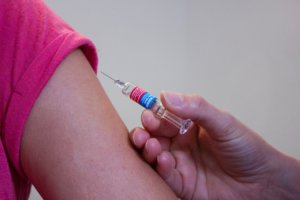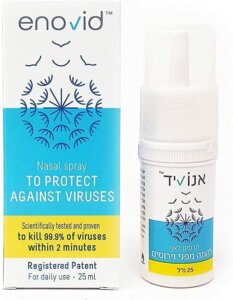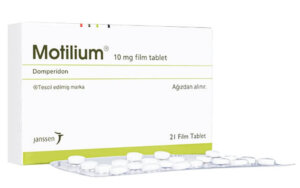Over the years there have been countless articles and studies on this topic, yet parents around the globe seem to have a hard time filtering through the emotions and finding the hard facts on this subject. Here at IsraelPharm, we have put together the findings from our research in the article below, in suppoisraelprt of National Immunization Awareness Month. Feel free to enjoy and pass around to your family and friends.
 Autism is a condition that is present from childhood that affects how a person communicates with other people and experience the world around them. It is a lifelong disability and can be a fundamental aspect of a person’s identity. There are different levels on the autism scale – some people can also have learning disabilities or mental health issues – and most autistic people can live a fulfilling life with the right support.
In recent years, there has been an increase in the number of diagnoses. This could be due to increased awareness and broadened diagnostic criteria, but it has led to many people thinking that vaccines are the cause.
Anecdote versus evidence
While studies to date have confirmed that there is no relationship between vaccines and autism, many people have anecdotal experiences to support their claims. A British gastroenterologist released a paper which showed that 8 children showed first symptoms of autism one month after receiving the MMR vaccine. However it has not been possible to prove if the occurrence of autism was causal or coincidental. The MMR vaccine is given between ages 1 and 2, which is also the most common time that autism presents itself.
In addition to this, there have since been several ecological studies that have addressed the question of whether the MMR vaccine causes autism. For example, in 1987 when the MMR vaccine was introduced, 473 autistic children were studied – those that were vaccinated and those that were not. The authors observed no difference in the symptoms between vaccinated and unvaccinated children.
For a lot of people, the timing of autism symptoms coincide with vaccinations but it is important to understand that scientists have conducted extensive research which has clearly shown that vaccines do not cause autism. The scientific evidence can be viewed here.
Children are at an increased risk of developing autism if there are genetic risk factors, pregnancy or birth complications or because of advanced parent age. The risk can also be decreased by taking folic acid during pregnancy. You can find more information on autism here.
Too many vaccines?
Autism is a condition that is present from childhood that affects how a person communicates with other people and experience the world around them. It is a lifelong disability and can be a fundamental aspect of a person’s identity. There are different levels on the autism scale – some people can also have learning disabilities or mental health issues – and most autistic people can live a fulfilling life with the right support.
In recent years, there has been an increase in the number of diagnoses. This could be due to increased awareness and broadened diagnostic criteria, but it has led to many people thinking that vaccines are the cause.
Anecdote versus evidence
While studies to date have confirmed that there is no relationship between vaccines and autism, many people have anecdotal experiences to support their claims. A British gastroenterologist released a paper which showed that 8 children showed first symptoms of autism one month after receiving the MMR vaccine. However it has not been possible to prove if the occurrence of autism was causal or coincidental. The MMR vaccine is given between ages 1 and 2, which is also the most common time that autism presents itself.
In addition to this, there have since been several ecological studies that have addressed the question of whether the MMR vaccine causes autism. For example, in 1987 when the MMR vaccine was introduced, 473 autistic children were studied – those that were vaccinated and those that were not. The authors observed no difference in the symptoms between vaccinated and unvaccinated children.
For a lot of people, the timing of autism symptoms coincide with vaccinations but it is important to understand that scientists have conducted extensive research which has clearly shown that vaccines do not cause autism. The scientific evidence can be viewed here.
Children are at an increased risk of developing autism if there are genetic risk factors, pregnancy or birth complications or because of advanced parent age. The risk can also be decreased by taking folic acid during pregnancy. You can find more information on autism here.
Too many vaccines?
 There has also been a lot of talk about the impact of too many vaccines in a short period of time on a child. Many parents are concerned that their children’s immune systems are not strong enough to deal with vaccinating on schedule. The fact is, infants are exposed to more antigens in his or her environment than all the vaccinations combined. A healthy child’s immune system is strong enough to handle the vaccines, but is not strong enough to fight serious diseases such as measles.
Children nowadays are getting more vaccines than they used to, which means that they will have immunity against 14 diseases by the age of 2. Vaccines today also contain fewer antigens than they used to. The vaccine schedule is designed to protect infants when they are most at risk.
Risks of not vaccinating
There has also been a lot of talk about the impact of too many vaccines in a short period of time on a child. Many parents are concerned that their children’s immune systems are not strong enough to deal with vaccinating on schedule. The fact is, infants are exposed to more antigens in his or her environment than all the vaccinations combined. A healthy child’s immune system is strong enough to handle the vaccines, but is not strong enough to fight serious diseases such as measles.
Children nowadays are getting more vaccines than they used to, which means that they will have immunity against 14 diseases by the age of 2. Vaccines today also contain fewer antigens than they used to. The vaccine schedule is designed to protect infants when they are most at risk.
Risks of not vaccinating
 Some parents decide to delay or reject some or all vaccines. This is a decision that they have researched and decided is the best course of action for their child. However, this decision also comes with a responsibility and risks.
Firstly, it is important to always tell medical staff that your child has not received all his or her vaccinations – whether it’s a doctor, pharmacist, in an emergency room or when you call 911. People with weak immune systems are more at risk for contracting diseases and so it’s important to isolate an unvaccinated child from these people.
Parents also need to be aware that their children can catch diseases from people who aren’t necessarily experiencing any symptoms.
A vaccine-preventable disease could potentially strike at any time in the United States or anywhere in the world. The disease can quickly spread among people who are not immune. It is important to learn the signs of these diseases and to immediately notify a medical professional if there is a concern. A full list of risks and responsibilities for people who choose not to vaccinate can be viewed here.
Conclusion
There is no scientific evidence to prove that there is a link between immunizations and autism. With that said, every parent has the responsibility to choose if and when to vaccinate their child. This comes with a responsibility to their child and to other people, and before making the decision it is important to thoroughly research the subject and understand all the risk factors.
What do you think about Autism and Vaccines? What does your family do? We would love to hear in the comments below.
Read here about 10 questions asked at the online pharmacy
Some parents decide to delay or reject some or all vaccines. This is a decision that they have researched and decided is the best course of action for their child. However, this decision also comes with a responsibility and risks.
Firstly, it is important to always tell medical staff that your child has not received all his or her vaccinations – whether it’s a doctor, pharmacist, in an emergency room or when you call 911. People with weak immune systems are more at risk for contracting diseases and so it’s important to isolate an unvaccinated child from these people.
Parents also need to be aware that their children can catch diseases from people who aren’t necessarily experiencing any symptoms.
A vaccine-preventable disease could potentially strike at any time in the United States or anywhere in the world. The disease can quickly spread among people who are not immune. It is important to learn the signs of these diseases and to immediately notify a medical professional if there is a concern. A full list of risks and responsibilities for people who choose not to vaccinate can be viewed here.
Conclusion
There is no scientific evidence to prove that there is a link between immunizations and autism. With that said, every parent has the responsibility to choose if and when to vaccinate their child. This comes with a responsibility to their child and to other people, and before making the decision it is important to thoroughly research the subject and understand all the risk factors.
What do you think about Autism and Vaccines? What does your family do? We would love to hear in the comments below.
Read here about 10 questions asked at the online pharmacy
What is autism?
 Autism is a condition that is present from childhood that affects how a person communicates with other people and experience the world around them. It is a lifelong disability and can be a fundamental aspect of a person’s identity. There are different levels on the autism scale – some people can also have learning disabilities or mental health issues – and most autistic people can live a fulfilling life with the right support.
In recent years, there has been an increase in the number of diagnoses. This could be due to increased awareness and broadened diagnostic criteria, but it has led to many people thinking that vaccines are the cause.
Anecdote versus evidence
While studies to date have confirmed that there is no relationship between vaccines and autism, many people have anecdotal experiences to support their claims. A British gastroenterologist released a paper which showed that 8 children showed first symptoms of autism one month after receiving the MMR vaccine. However it has not been possible to prove if the occurrence of autism was causal or coincidental. The MMR vaccine is given between ages 1 and 2, which is also the most common time that autism presents itself.
In addition to this, there have since been several ecological studies that have addressed the question of whether the MMR vaccine causes autism. For example, in 1987 when the MMR vaccine was introduced, 473 autistic children were studied – those that were vaccinated and those that were not. The authors observed no difference in the symptoms between vaccinated and unvaccinated children.
For a lot of people, the timing of autism symptoms coincide with vaccinations but it is important to understand that scientists have conducted extensive research which has clearly shown that vaccines do not cause autism. The scientific evidence can be viewed here.
Children are at an increased risk of developing autism if there are genetic risk factors, pregnancy or birth complications or because of advanced parent age. The risk can also be decreased by taking folic acid during pregnancy. You can find more information on autism here.
Too many vaccines?
Autism is a condition that is present from childhood that affects how a person communicates with other people and experience the world around them. It is a lifelong disability and can be a fundamental aspect of a person’s identity. There are different levels on the autism scale – some people can also have learning disabilities or mental health issues – and most autistic people can live a fulfilling life with the right support.
In recent years, there has been an increase in the number of diagnoses. This could be due to increased awareness and broadened diagnostic criteria, but it has led to many people thinking that vaccines are the cause.
Anecdote versus evidence
While studies to date have confirmed that there is no relationship between vaccines and autism, many people have anecdotal experiences to support their claims. A British gastroenterologist released a paper which showed that 8 children showed first symptoms of autism one month after receiving the MMR vaccine. However it has not been possible to prove if the occurrence of autism was causal or coincidental. The MMR vaccine is given between ages 1 and 2, which is also the most common time that autism presents itself.
In addition to this, there have since been several ecological studies that have addressed the question of whether the MMR vaccine causes autism. For example, in 1987 when the MMR vaccine was introduced, 473 autistic children were studied – those that were vaccinated and those that were not. The authors observed no difference in the symptoms between vaccinated and unvaccinated children.
For a lot of people, the timing of autism symptoms coincide with vaccinations but it is important to understand that scientists have conducted extensive research which has clearly shown that vaccines do not cause autism. The scientific evidence can be viewed here.
Children are at an increased risk of developing autism if there are genetic risk factors, pregnancy or birth complications or because of advanced parent age. The risk can also be decreased by taking folic acid during pregnancy. You can find more information on autism here.
Too many vaccines?
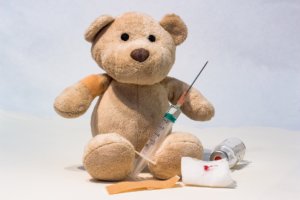 There has also been a lot of talk about the impact of too many vaccines in a short period of time on a child. Many parents are concerned that their children’s immune systems are not strong enough to deal with vaccinating on schedule. The fact is, infants are exposed to more antigens in his or her environment than all the vaccinations combined. A healthy child’s immune system is strong enough to handle the vaccines, but is not strong enough to fight serious diseases such as measles.
Children nowadays are getting more vaccines than they used to, which means that they will have immunity against 14 diseases by the age of 2. Vaccines today also contain fewer antigens than they used to. The vaccine schedule is designed to protect infants when they are most at risk.
Risks of not vaccinating
There has also been a lot of talk about the impact of too many vaccines in a short period of time on a child. Many parents are concerned that their children’s immune systems are not strong enough to deal with vaccinating on schedule. The fact is, infants are exposed to more antigens in his or her environment than all the vaccinations combined. A healthy child’s immune system is strong enough to handle the vaccines, but is not strong enough to fight serious diseases such as measles.
Children nowadays are getting more vaccines than they used to, which means that they will have immunity against 14 diseases by the age of 2. Vaccines today also contain fewer antigens than they used to. The vaccine schedule is designed to protect infants when they are most at risk.
Risks of not vaccinating
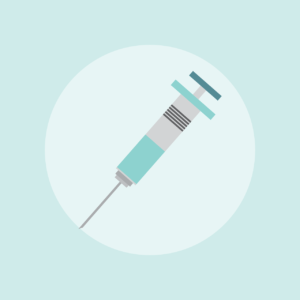 Some parents decide to delay or reject some or all vaccines. This is a decision that they have researched and decided is the best course of action for their child. However, this decision also comes with a responsibility and risks.
Firstly, it is important to always tell medical staff that your child has not received all his or her vaccinations – whether it’s a doctor, pharmacist, in an emergency room or when you call 911. People with weak immune systems are more at risk for contracting diseases and so it’s important to isolate an unvaccinated child from these people.
Parents also need to be aware that their children can catch diseases from people who aren’t necessarily experiencing any symptoms.
A vaccine-preventable disease could potentially strike at any time in the United States or anywhere in the world. The disease can quickly spread among people who are not immune. It is important to learn the signs of these diseases and to immediately notify a medical professional if there is a concern. A full list of risks and responsibilities for people who choose not to vaccinate can be viewed here.
Conclusion
There is no scientific evidence to prove that there is a link between immunizations and autism. With that said, every parent has the responsibility to choose if and when to vaccinate their child. This comes with a responsibility to their child and to other people, and before making the decision it is important to thoroughly research the subject and understand all the risk factors.
What do you think about Autism and Vaccines? What does your family do? We would love to hear in the comments below.
Read here about 10 questions asked at the online pharmacy
Some parents decide to delay or reject some or all vaccines. This is a decision that they have researched and decided is the best course of action for their child. However, this decision also comes with a responsibility and risks.
Firstly, it is important to always tell medical staff that your child has not received all his or her vaccinations – whether it’s a doctor, pharmacist, in an emergency room or when you call 911. People with weak immune systems are more at risk for contracting diseases and so it’s important to isolate an unvaccinated child from these people.
Parents also need to be aware that their children can catch diseases from people who aren’t necessarily experiencing any symptoms.
A vaccine-preventable disease could potentially strike at any time in the United States or anywhere in the world. The disease can quickly spread among people who are not immune. It is important to learn the signs of these diseases and to immediately notify a medical professional if there is a concern. A full list of risks and responsibilities for people who choose not to vaccinate can be viewed here.
Conclusion
There is no scientific evidence to prove that there is a link between immunizations and autism. With that said, every parent has the responsibility to choose if and when to vaccinate their child. This comes with a responsibility to their child and to other people, and before making the decision it is important to thoroughly research the subject and understand all the risk factors.
What do you think about Autism and Vaccines? What does your family do? We would love to hear in the comments below.
Read here about 10 questions asked at the online pharmacy 
